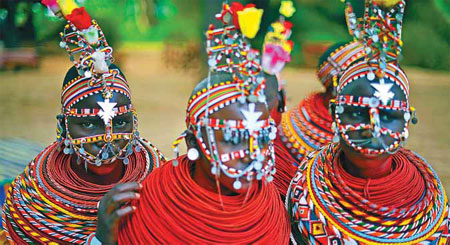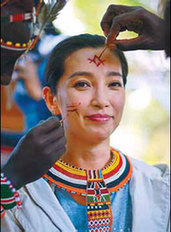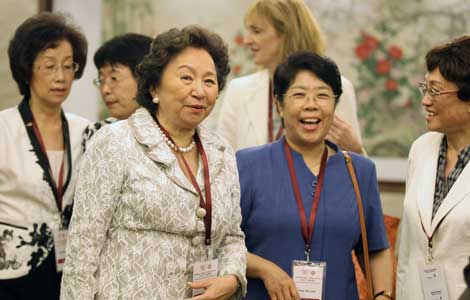More tourists planning visits
Updated: 2013-08-13 07:28
By Li Lianxing (China Daily)
|
||||||||

|
Samburu women look on in the Samburu game reserve in May. United Nations Environment Programme goodwill ambassador and Chinese actress Li Bingbing was on an official visit to the Samburu reserve in Kenya to highlight issues of Africa's poaching crisis. Carl de Souza / Agence France-Presse |
|
United Nations Environment Programme goodwill ambassador and Chinese actress Li Bingbing is given temporary tribal markings by a member of the Samburu tribe in May. Carl de Souza / Agence France-Presse |
Chinese guests showing great interest in the African country
Before Su Li, a 45-year-old manager of a travel agency in Yunnan province, went to Kenya in August with her family and clients, she was concerned the scenes in such a remote place might disappoint her group, and she did not know about the conditions in the country.
"We saw the wildebeest migration on television, but it was just on the TV and we didn't know how many animals were there and how spectacular it would be," she said. "This trip costs much more than going to Europe or the United States."
Su has been in the industry for more than 23 years and said it's very difficult but important to discover new destinations, especially for a place like Africa, which most Chinese travelers consider remote. She said her trip was a good test to see if Kenya is a good destination for her customers in the future.
"It eventually proved to be a memorable journey that I will strongly recommend and sell to my clients," Su said. "One can experience the most splendid natural gifts in this land that no other place could offer."
Like Su, many Chinese tourists are putting Africa on their agenda to get away from traditional travel destinations such as Europe, the US and Southeast Asian countries. Kenyan Tourism Minister Danson Mwazo said the number of tourists to Kenya in 2012 decreased, but the number of Chinese arrivals increased by 10.4 percent from a year earlier to 41,300.
Kenyan President Uhuru Kenyatta said his country must diversify its tourism market and attract more Chinese tourists, while continuing to provide good service to guests from the West.
Joseph Paul, 44, is a driver who has worked in Kenya for more than 18 years. He said it has been a surprise for him to see the explosion of Chinese tourists coming to Kenya in the past two years.
"Before 2012, there was a decrease of tourists traditionally from the West and Asian faces were rare, so we worried about the industry," he said. "But in the summer of 2012, the savannah and hotels were full of Chinese tourists and they showed a great interest in our country."
Future targets
He used to work for a tourist agency that mainly received European and American guests, but he decided last year to move to a Chinese agency as he considers the Chinese are the future targets of the country's tourism.
"I don't know why some countries have issued travel warnings about my country, which has affected clients' choices. But now we expect more Chinese to fill that gap and even bring more business," he added.
However, he said there are several mysteries about the tourism and natural heritage of Kenya, which has hampered the industry.
"In my opinion, there shouldn't be a peak season or a slow season because wild animals and beautiful landscape are always there - you can see the Africa big five at any time," he said, referring to the most popular animals. "People divide the seasons based on the time of the animal migrations, but, unfortunately, the crossings are also very rare at peak season and the price of accommodations is much more expensive than at other times."
He suggested tourists go to Kenya at any time convenient for them, especially in the slow season, to avoid crowds and overpricing.
Song Shengfeng, a 46-year-old traveler from Hebei province, visited Masai Mara with his family in August and said the country provided them with more than he expected.
"The facilities along the route, especially the hotels and services, were so nice that I even thought we were in Europe," he said. "We were actually prepared for poor conditions, for instance, unhygienic conditions or a lack of water."
Although wealth disparities could be seen along the roads, the general situation of the country was not as poor as they had been informed, he said.
"I think to understand and witness the real Africa requires coming here to touch it, because seeing is believing," he said.
Song and his family were also impressed by the harmony between people and the wildlife.
"Conflicts of living spaces are still there between the Masai people and lions, for instance, but we learned of the sacrifices they have made for nature and the wildlife," he said. "It's admirable and amazing that a national park could be established just next to a town center, and they get along with each other smoothly."
This is a lesson China should learn from Africa for a better living environment and relationship with nature, he added.
According to the Kenyan Ministry of Tourism, visitors to Kenya in 2012 decreased from 1.26 million to 1.23 million and revenue shrank by 2 percent to 96 billion Kenyan shillings ($1.09 billion).
The decrease was mainly because of several kidnappings of tourists and pre-general election tensions, according to the ministry.
Travel warnings
Several Western countries issued travel warnings for Kenya before the traditional peak seasons. The majority of tourists to Kenya are from the West, and Chinese visitors account for only a small proportion, said Han Jun, chairman of the China General Chamber of Commerce in East Africa, who also runs a travel agency in Nairobi.
"There will still be an increase of Chinese tourists this year, but it will not be too pronounced because of the limited service capacity of this country," he said. "Chinese tourists' decisions about coming to Kenya will not be affected by Western travel warnings but by domestic social media."
He said that during the past two decades, no Chinese tourists were reported to have been endangered by the social situation, so they feel less concerned about safety in Kenya.
"The only accidents that happened were traffic accidents, and they were operated by illegal tourism agents," he added.
But he showed some concern about the recent fire at the Nairobi international airport, which affected hundreds of passengers' scheduled trips and raised worries about the country's safety situation.
"When CCTV did a live show on the animal migration in Masai Mara last year, the Chinese audience suddenly realized Kenya was a favorable tourist destination and started coming here," he said.
The live broadcast of the wild animal migration was very attractive to the Chinese audience, and it is also a good way to promote Kenyan tourism, said Song Jianing, chief of the CCTV Africa Bureau.
"Kenya has very good tourism resources that were not known to Chinese tourists before, so when we decided to do this program last year. We received support from both China and Kenya," she said. "The Kenyan television stations had long been wanting to do this but due to a lack of funds and technology, they thought cooperation with us was a very good choice to promote their natural wonders."
CCTV started its live broadcast in July 2012 and conducted a second in August. The live show ran from 4 to 6 pm on the station's news channel with various topics and local guest hosts.
lilianxing@chinadaily.com.cn
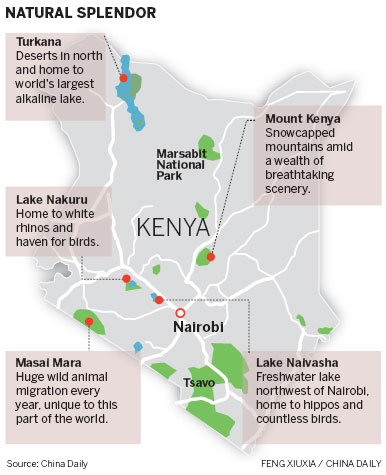
(China Daily USA 08/13/2013 page6)
Most Viewed
Editor's Picks
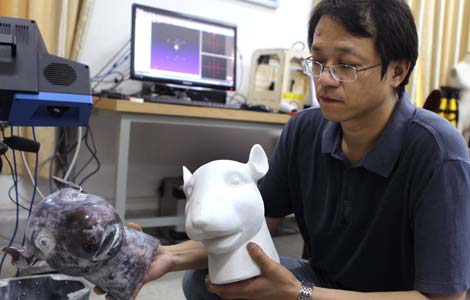
|

|

|

|

|

|
Today's Top News
Academy will turn a Hilton into a dorm for Chinese
Brazil puts off bidding on bullet train
US to examine intelligence collection methods
Economists cautious about China's recovery
Consumers losing confidence in Fonterra
Surge in raw material imports 'positive'
Research funds spread across the globe
Reps gear up for TPP round 19
US Weekly

|

|
